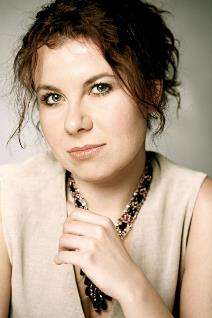|
Back
Puzzles for a Tenth Anniversary New York
Austrian Cultural Forum, 11 East 52nd Street
04/18/2012 - April 19, 2012
György Kurtág: In Nomine–all’ongherese
Roman Haubenstock-Ramati: String Trio
Salvatore Sciarrino: Malinconie
Johannes Maria Staud: Celluloid
Isang Yun: Quartet for oboe, violin, viola and violoncello
Franco Donatoni: Filli
Agata Zubel: What is the word(World Premiere)
Klangforum Wien: Vera Fischer (Flute), Markus Deuter (Oboe, Cor anglais), Lorelei Dowling (Bassoon), Gunde Jäch-Micko (Violin), Elaine Koene (Viola), Andreas Lindenbaum (Cello), Florian Müller (Piano), Agata Zubel (Voice)
Bruce Hodges (Interlocutor)

A. Zubel (© Jakub Pajewski)
Self-humiliation is one consequence for attending a concert at the Austrian Cultural Forum of New York (ACFNY) without any precognition of music to be played. Foreknowledge may not be necessary for the usual recitals in New York, but the ACFNY presents the most serious European contemporary music, with minimal explanation, and never ever any compromise.
Listening to an unknown song-cycle by Krenek or the one-hour Cimmerian quartet by Haas in this building has its rewards. But one can be equally puzzled, frustrated, even tormented when unknown composers with unknown musical languages are presented even to this knowledgeable audience.
Due to scheduling mishaps, I had rushed over to ACFNY without an iota of information for their Tenth Anniversary concert. But noting that the performers came from Klangforum Wien indicated that the music could be as rewarding as it was difficult.
Klangforum Wien is the 24-person equivalent of the American ICE and JACK quartets, at the forefront of contemporary music (and regular performers at ACFNY). The Klangforum musicians are of the very highest order, and their affinity for Central European music gives them a special artistic bonding.
Last night, I confess to knowing only two of the composers, both of whom revel in quantum brevity. They were not disappointing. Kurtág’s Hungarian In Nomine has been played by (and may have been composed for) violin. But Marius Deuter was happily at ease with the English horn. The work was short, sweet and Mr. Deuter obviously knew how to make the colorations as subtle as Kurtág wrote for violin.
The other familiar name was Salvatore Sciarrino, whose rare New York performances (including an opera based on Kafka) are testaments to understatement. One doesn’t have to know tone rows or structures to understand that his slightest nuances are the most meaningful.
This was true with Malinconia (no relation to the film Melancholia, which needed a full Wagnerian orchestra for its music). Here the composerr used only violin and viola. They whispered to each other, trod on each other’s notes, made musical motions to each other and backed away in an intriguing dialogue.
The other dialogue was Franco Donatoni’s Filli for piano and flute. Until the final measures, pianist Florian Müller played tiny clusters in the flute’s register, flautist Vera Fischer replying with little chirps of her own. The flute became more garrulous, the piano a bit more passive, the two instruments swirled around each other like moths (without a light for their centers), not quite bullying each other, but on the verge of aggression.
But Mr. Donatoni obviously is an ethical gentleman. This was discussion, not war.
The only other piece that was sheer delight was Celluloid by Johannes Maria Staud. The front of the stage was blocked by four music-holders, each holding several pages of music. Solo bassoonist Lorelei Dowling started at stage right and gradually moved to stage left. That Celluloid “story” thus was horizontal, but while we never learned the plot, the characters–characters enacted by dozens upon dozens of bassoon experimental sounds, ranging from the jazzy to the moribund–were fascinating. Any imaginative writer could take her characters and write a terrific story line.
Two of the pieces left me cold. Isang Yun was a pioneer, as the first major Korean composer, living in Germany, but his atonal Quartet sounded rather old-fashioned. A trio by Roman Haubenstock-Ramati was played beautifully (as was all the music), but I was sitting in front of the cellist, and his voice precluded hearing the ensemble as a whole.
The star of the evening, the charming young Polish composer-singer Agata Zubel, gave an interview with Bruce Hodges before the concert. But her music spoke (and sung) for itself.
What is the word, commissioned by Klangforum Wien and the Adam Mickiewicz Institute for the Tenth Anniversary of ACFNY, is based on a poem by Samuel Beckett, and the “word” was “folly”. One would think that Beckett’s words speak for themselves, for he dissected, amputated, and lobotomized the word in his little ditty. But his music was as palpable as that of his mentor, James Joyce. Obviously composers, from Berio to Feldman have been drawn to him. (A recent biography I read of Beckett mentioned that his own taste swung to Chopin and Beethoven, but never mind...)
Ms. Zubel’s ensemble was part of her own voice, which didn’t exactly sing, but uttered and, in Beckett style cut up the words in different registers. The vocals and instruments (mainly flute and piano) were part of her voice. The ten minutes did not enlighten one on Beckett or even words. But it was a likeable musical diversion for which one could relax, query and enjoy.
Harry Rolnick
|